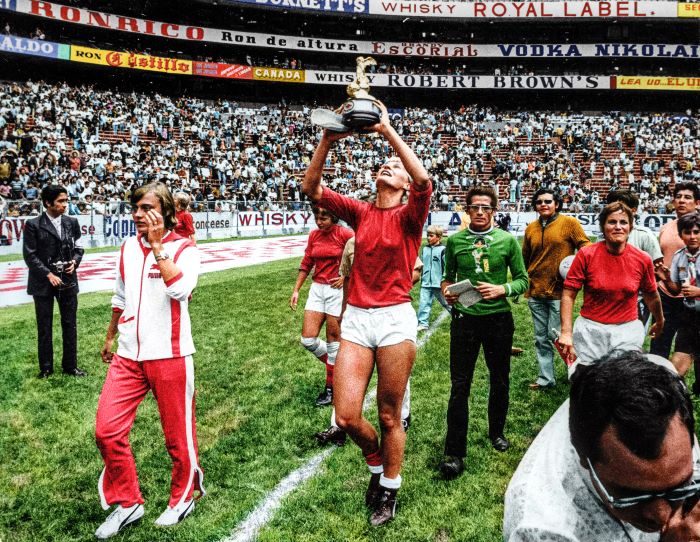Brandi Chastain, soccer champion of the 1990s, can’t believe what she’s seeing. She is watching a women’s soccer tournament on a tablet. The game onscreen is fast and competitive, with bold strikes cheered by more than 100,000 spectators. And it took place in 1971. Chastain is stunned. Why didn’t she know about this groundbreaking match? “It makes me happy and quite infuriated, to be honest with you.”
This is the powerful opening scene of Copa 71, a documentary on the first women’s soccer world cup—a passage of forgotten sports history. Tennis greats Venus Williams and Serena Williams have joined soccer star Alex Morgan to produce a recap of this event just in time to ride the current wave of interest in women’s sports. The film can emphasize emotions more than important facts, but it’s a rousing and absorbing look back at a phenomenon that quickly crested and just as quickly disappeared. Why? We have men’s greed and control-freakery to thank.
Copa 71 makes great use of interviews featuring the first women soccer trailblazers. They share poignant, inspiring, and sometimes bitter stories of the roller-coaster the Women’s World Cup put them through. Many participants resisted opposition from their families and threw themselves headlong into the sport. Their attempts at big-time play were mocked by male professional football association executives, shown here deriding women’s soccer as “a good joke” and “an erotico-comic curiosity.”
The scorn turned to greed as men’s soccer started raking in huge amounts of money and soccer managers saw an opportunity. Promoters started a women’s cup, only one not authorized by the official governing FIFA association (a bureaucratic snafu that would cause big problems later). Blaring that “uniforms would be as close as possible to hot pants,” organizers saw massive crowds rolling up for the games. The final match in the tournament drew 110,000 spectators in Mexico City—to date, the biggest attendance for any women’s sporting event.
The women recall a sense of community with rival players and the excitement of a dream come true: “Tears rolled down my cheeks, and I thought ‘I’m never going to see this again,’” remembers the UK’s Carol Wilson. How right she was. The men running the world soccer apparatus were stung by the popularity of the women’s game. According to commentator Chris Lockwood, “The immediate reaction is—like all wounded men—negative, violent, and aggressive.” Official football pulled the plug on the women’s league and shut the teams out of the world soccer monopoly, leaving the players without games and stunned by the fallout. Only now have their trailblazing attainments been rediscovered.
A voice-over by Venus Williams declares that footage of the women’s soccer cup was deliberately hidden for 50 years. It would be interesting to hear more about this act of omission—the shutoff of the game plays out very swiftly in the narrative. However, a sense of bravery and achievement remains. We see it echoed in stirring footage of contemporary soccer featuring great scores by Chastain and former U.S. team captain Megan Rapinoe. As Chastain says about the unearthing of this overlooked championship, “It’s up to us to tell the stories. To make sure that history is right.” The filmmakers have revealed important untold stories and told them well. Gooooaal!







Leave A Comment